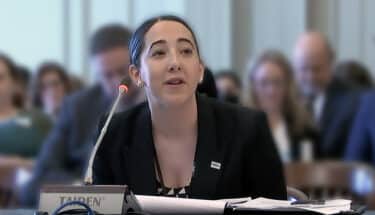New Jersey’s paid family leave law has been changed to provide more generous benefits and expanded paid leaves, and to require more small businesses to guarantee job protection for workers on leave.
Under the legislation (A-3975) signed today by Gov. Phil Murphy, employers with 30 or more employees will have to comply with the law’s job protection requirement (the previous threshold was 50 employees). The new law also doubles the amount of paid leave time employees can take from six to 12 weeks, and increases the maximum weekly benefit from $650 a week to $860.
“This comprehensive paid family leave program, coupled with the newly passed earned sick leave and minimum wage increase, are fundamental elements in building a stronger and fairer New Jersey for all working families,” Murphy said.
NJBIA President & CEO Michele Siekerka said doubling the length of paid family leave, and expanding the job protection requirement to include smaller employers, means more businesses face the added cost of paying overtime or hiring replacement workers to cover for absent employees.
“Considering that New Jersey is one of only four states that have paid family leave to begin with, it will put our small businesses at an even greater competitive disadvantage,” Siekerka said.
“Once again, small businesses in New Jersey have been hit with another costly mandate seemingly without any thought or concern about the cumulative impacts of other mandates already placed on their backs, such as expanded paid sick leave, a $15 minimum wage, and the highest business taxes in the nation,” Siekerka said.
The mandatory paid sick leave law that took effect in October 2018 impacts all employers. Small businesses are already scrambling to comply with that new law and will soon have to figure out how to pay the $15 an hour minimum wage, which will be phased in beginning July 1 when the $8.85 minimum wage jumps to $10 an hour on the path to $15 by Jan. 1, 2024.
Siekerka said the challenges that businesses face under the expanded paid family leave law could have been worse had it not been for NJBIA’s efforts to mitigate some of the most onerous provisions during the legislative committee process.
For example, the bill originally sought to double the amount of intermittent family leave time allowed from 42 days to 84 days. Eventually, that provision was amended to 56 days, instead of 84.
In its original form, the bill also would have increased weekly benefits from two-thirds of a worker’s average weekly wage to 90 percent of their pay with maximum benefits capped at 100 percent of the average weekly wage for all workers in New Jersey. As amended, the new law provides benefits at 85 percent of a worker’s average weekly wage, not 90 percent, and caps maximum benefits at 70 percent of the average New Jersey weekly wage, rather than 100 percent.





